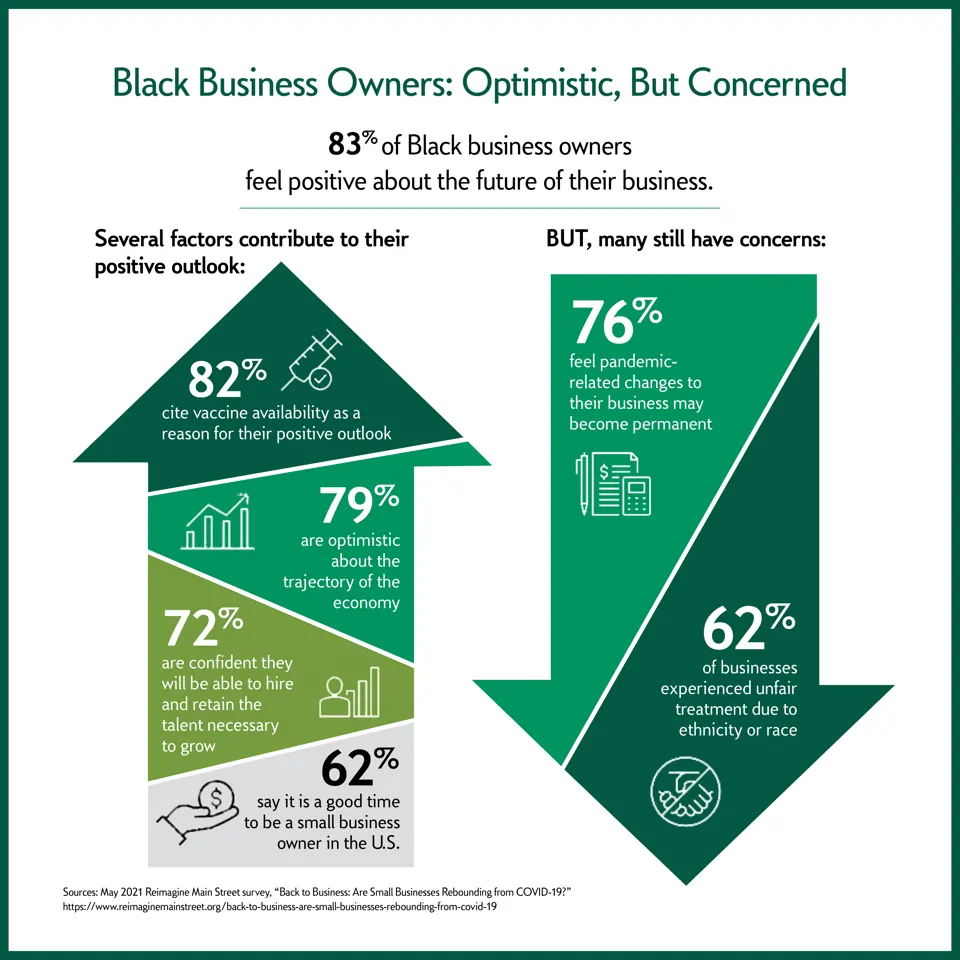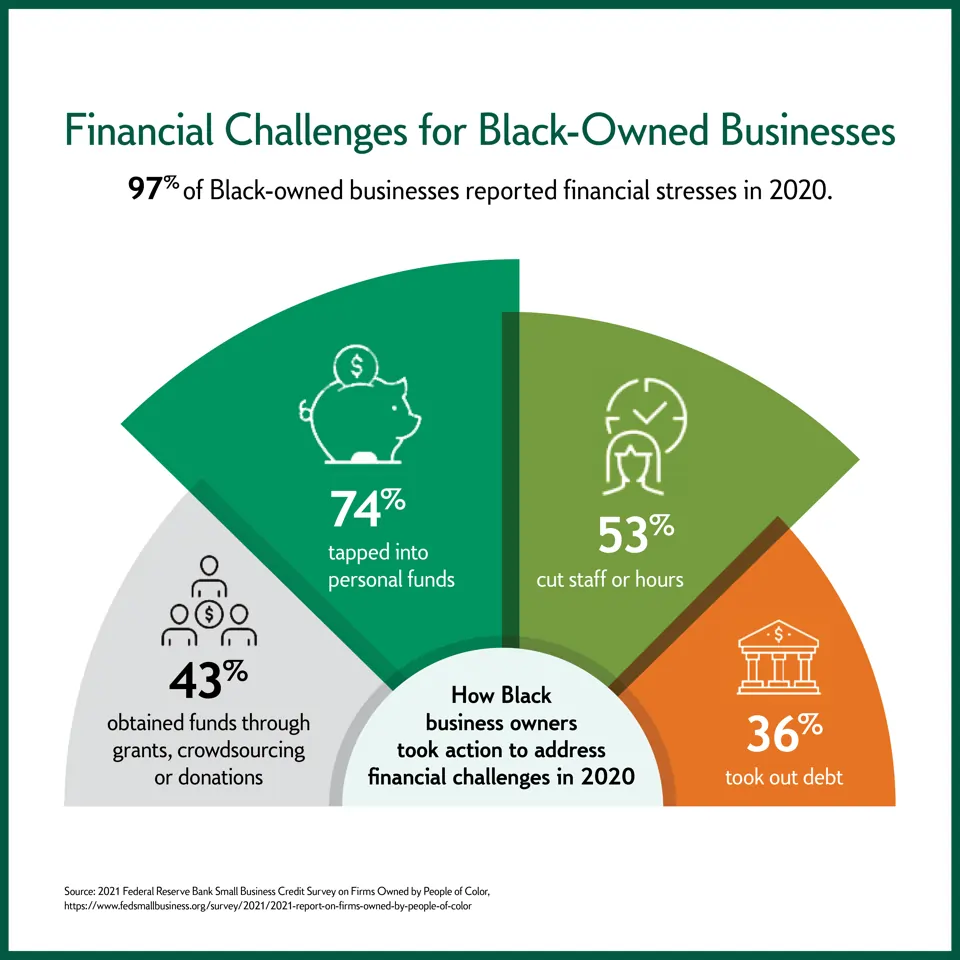Celebrating Black-owned businesses: entrepreneurs offer tips for success

Key takeaways
- Successful Black business owners say focusing on business fundamentals is essential to success. This includes cash flow, pricing, writing contracts, business planning, and taxes. They advise remembering that you don’t have to go it alone: find resources to build these skills or hire people who can help.
- Understand that your business will have ups and downs, but that does not mean you won’t succeed. Learning to delegate and keeping a close eye on your customer and their evolving needs can help your business grow.
- There are unique challenges and opportunities to being a Black business owner. Entrepreneurs advise seeking out the resources available to Black entrepreneurs and never take “no” for an answer.
Our nation’s 2.6 million Black-owned businesses make significant contributions to the U.S. economy, generating more than $150 billion in revenue annually and employing almost one million Americans. We chatted with three Citizens Small Business Community Champion Award winners to get their insight on the challenges and opportunities for Black-owned businesses and how to be ready for success.
- Garnette Archer, owner of Jo’s Gallery 2, LLC, a Detroit gallery specializing in African American art.
- Aitina Fareed-Cooke, CEO and Creative Director of Get Fokus’d Productions, a Buffalo, NY-based developer of youth arts and education programs.
- Georgetta Rue, CEO, of DeLoJe, a Pittsburgh, PA-based marketing and multimedia consultancy for small businesses.
Citizens: What do you wish someone had told you about opening a business when you were first starting out?
Garnette Archer: You don’t have to go it alone. Make sure you’re aware of the resources available to help fill in the gaps in areas where you might not have experience or expertise. For example, in my area, Detroit Means Business — a collaboration between the mayor’s office and the Detroit Economic Growth Corporation — helps small businesses find resources for technology, safety protocols, and other needs. I also benefited from the Goldman Sachs® education program called 10,000 Small Businesses, which is focused on small business growth. These types of organizations can help you get connected and start networking.
Aitina Fareed-Cooke: Practical things, like understanding how to fund a business and where to focus my worry. Making impulsive decisions about spending in a business can lead to bad decisions. I needed to understand my spending tendencies. There are more intangible things too, like how tough business is and how many pillows you may have to cry into. With these ups and downs, you need to distinguish danger from fear. Danger is real, but fear is in your mind.
Georgetta Rue: Have good, clear contracts from the start. One of the things that caused me the most grief early on was learning the basics of contract development. In some instances, a standard contract is good, but sometimes that isn’t enough and client requests can become overwhelming. Starting out, I wish we had learned more quickly the importance of having a clear scope of work with no ambiguity for things like licensing and intellectual property. Having better contracts has added stability and created a solid foundation for relationships with our clients. Once we got a handle on that, everything ran much smoother — and I was able to sleep much better at night.

Citizens: What challenges did you face as your business started to grow?
Archer: My background was in corporate America and I have two business degrees, but in college no one talks about things like payroll taxes. I learned quickly that it is important to have a good accountant who understands your bookkeeping, especially if you’re going to apply for grants or business loans.
Fareed-Cooke: Maintaining cash flow, for sure. As we started to get contracts, it was important to understand how to manage money as it came in, so we had what we needed to grow the business. And time management was another serious thing. I had to dig in and try to understand what prevented me from delegating to other people. I had to learn to trust other people and know that I could delegate to them.
Rue: One problem we faced was getting our pricing right, and creating a framework for billing. At the start, I didn’t factor all of our business expenses into what we charged clients. It also took some time for us to understand and recognize how much work our staff would need to put into each project. We needed to know what all aspects of a job would require timewise, particularly if there were extra technology requirements. And, we needed to have honest conversations with both our production team and our clients to develop timeframes that were reasonable and realistic. Early on, we ended up saying yes to things without realizing how much effort would actually be required.

Citizens: What tips do you have for other entrepreneurs?
Archer: Have a business plan. I’ve had several over the years, and am actually working on a new one now. Every two years it is important to review where you are going, and it really helps to get your ideas out of your head and down on paper, to give you a clear vision of where you want to be.
Fareed-Cooke: Find the thing you love and if you can, find a way to earn an income from that. Every day, everyone has the same 24 hours. Use them wisely and choose to be happy. Everyone deserves that. Then, learn as much as you can about things like time management and cash flow. And, surround yourself with individuals who are likeminded but diverse, so you have people who may think a little differently on your team.
Rue: Do your research. Know what your competition is doing as you decide what direction to take. And don’t try to do too much too fast. There’s nothing wrong with a slow and steady approach. Create a to-do list with your objectives and keep at it. You’re going to make mistakes, and when something goes awry, pick yourself up, dust yourself off, and keep moving forward.
Citizens: Are there particular challenges you’ve faced as a Black woman in business? How did you overcome them?
Archer: This is probably one of the best times ever to be a minority or woman-owned business, because there are lots of resources out there. But I’ve never seen it as a hindrance, because our retail clientele is African American. Next year, we’ll be expanding into commercial art sales to places like hotels and small municipal buildings, and that may be a different animal. So we’re taking it slowly and doing our research, so we’ll know our target audience.
Fareed-Cooke: There are things that get in the way, but I have an optimistic approach to life. I don’t want to place myself in a circumstance where there are barriers I can’t control. I can’t control that I’m a woman or the color of my skin — my beautiful brown skin is what it is, it’s here. I can’t control what happened in my childhood. What I can do is focus my mind, work hard, have a goal, and run toward it. I’m talented, I’m educated, and I’m very confident in who I am. I face things fiercely — I refuse to take on a victim mentality. I worked hard and I knew what I wanted. I look back and I’m happy for all the trials, because they helped make me who I am.
Rue: Over the last few years, I’ve learned to read a room, research clients, and to be tenacious. Most successful women are. You need to take a “no” as “not right now,” and try to address people’s concerns. Often, men prefer to work with men — and women do too. It’s sad, and I don’t understand it. My advice is to not think of yourself as a “woman business owner.” Don’t pigeonhole yourself — think of yourself as a business owner. When I’m breaking barriers, most of the time I don’t realize I’m doing it. For example, when I got my Federal Aviation Administration (FAA) drone certification, I became the first female drone pilot in Western Pennsylvania. I didn’t do it to be the first, I did it because our business needed to do aerial photography.
Citizens: How did the pandemic impact your business?
Archer: For us, aside from when we had to shut down, the pandemic actually became a bit of a boom time. Our gallery had never needed much of an online presence in the past. We had been working for a few years to develop our website, and COVID made that all the more necessary. We brought on a full-time social media person to help too. We’ve always worked with emerging Black artists in the Detroit area, and have now been able to expand to work with more across the country. We’re also starting to offer framing services online, which creates the opportunity to turn a $60 print sale into a $400 framed print sale.
Fareed-Cooke: When the pandemic started, I did get fearful, because the majority of contracts I get come from schools, and they closed down. Offering virtual programs opened a bunch of doors for us, and allowed us to expand our programming to other cities. There was a lot to figure out as we shifted our business, but I was able to utilize everything I knew about video production and the online space. Sometimes things may look like a strike against you, but it can be a blessing in disguise.
Rue: When everything was closed down except for essential services, that was devastating. We wanted to keep paying our staff as long as we could. It was hard to sit at home doing nothing. Then, we started to think about what we could do for others, and that reminded me of our mission to help other businesses. We began offering technology assistance on a volunteer basis, and soon we were in demand with some clients that were able to pay.
Related topics
Q&A: The importance of financial education for Black-owned businesses
Plotting a brighter future for all children
Small business support
© Citizens Financial Group, Inc. All rights reserved. Citizens Bank, N.A. Member FDIC
Disclaimer: The information contained herein is for informational purposes only as a service to the public and is not legal advice or a substitute for legal counsel. You should do your own research and/or contact your own legal or tax advisor for assistance with questions you may have on the information contained herein.
